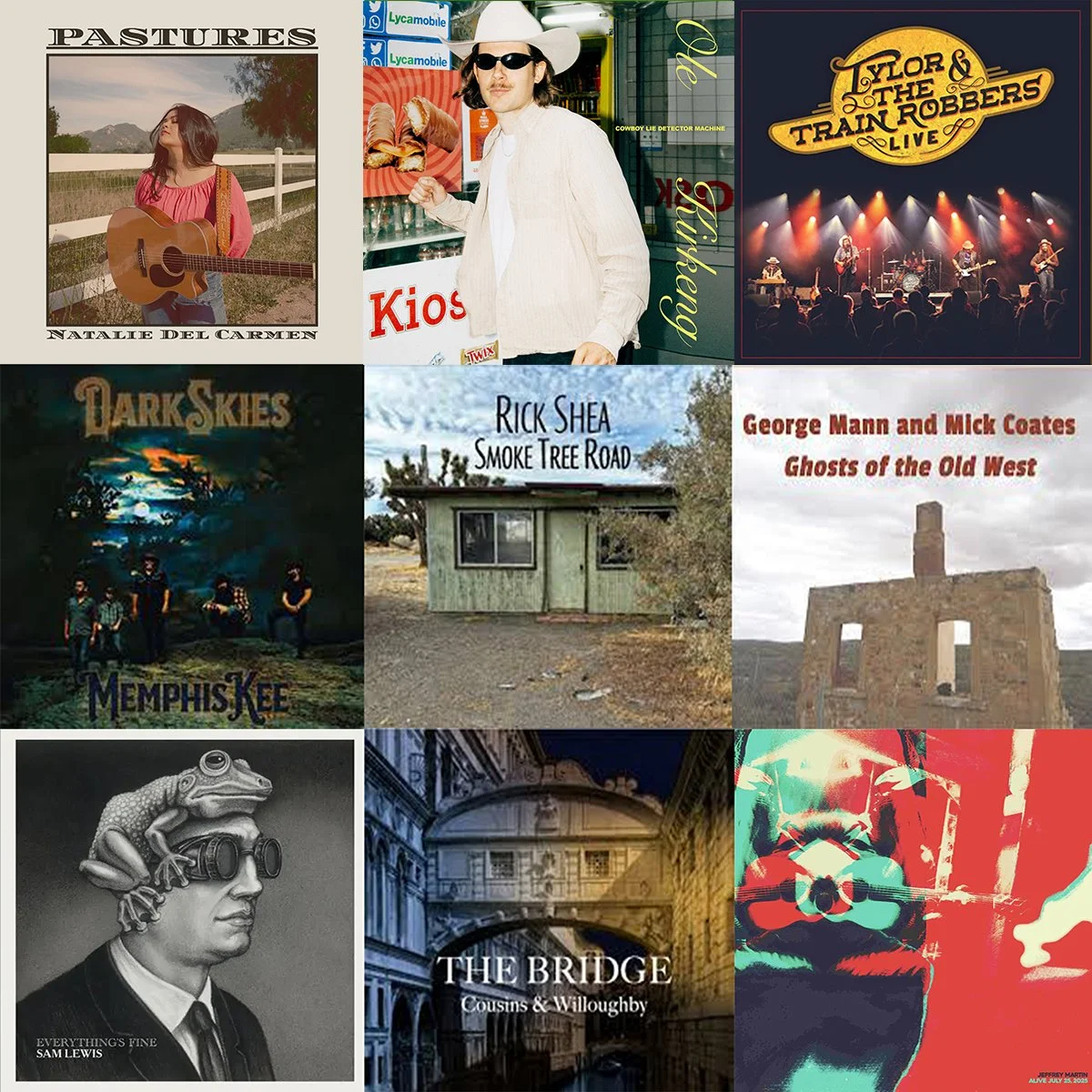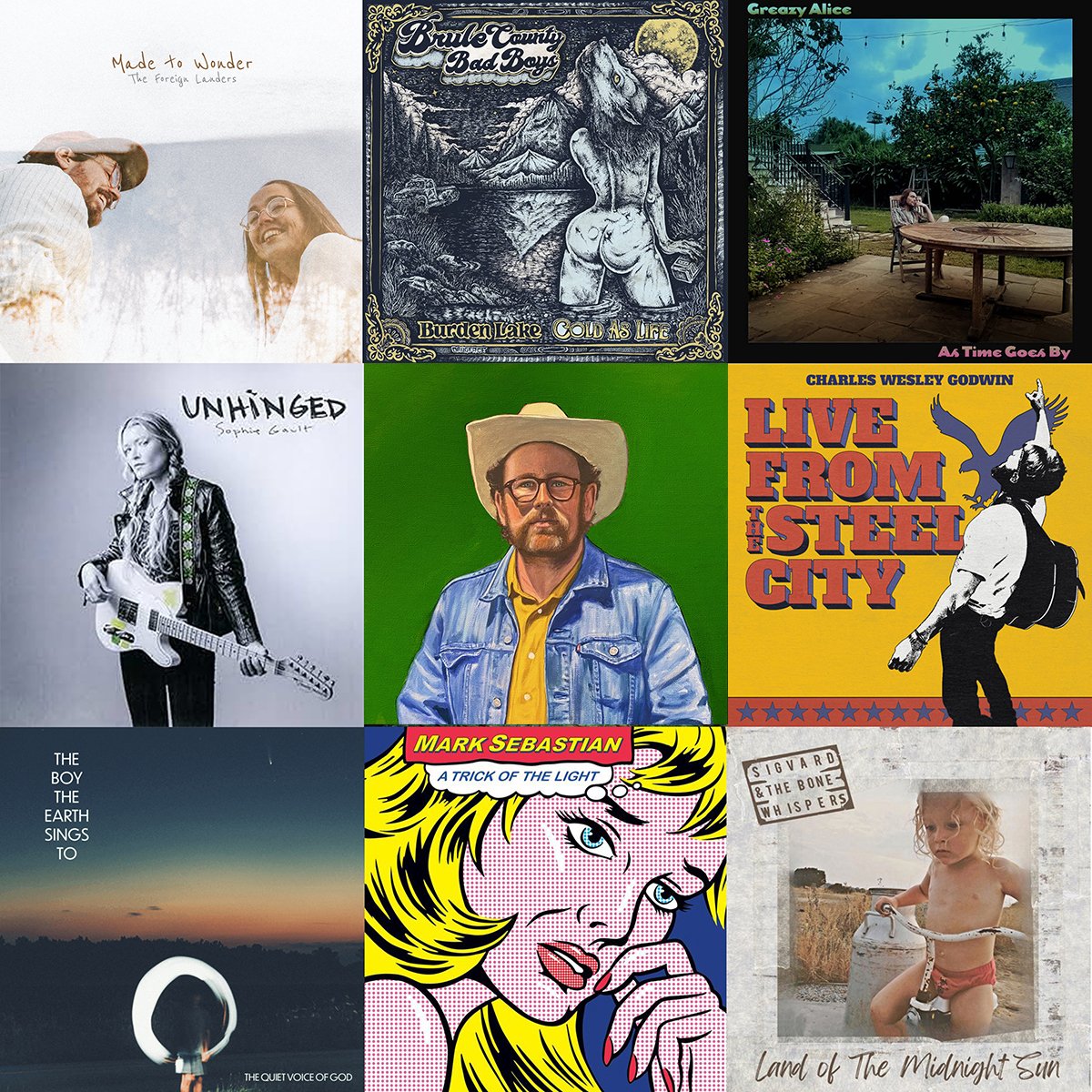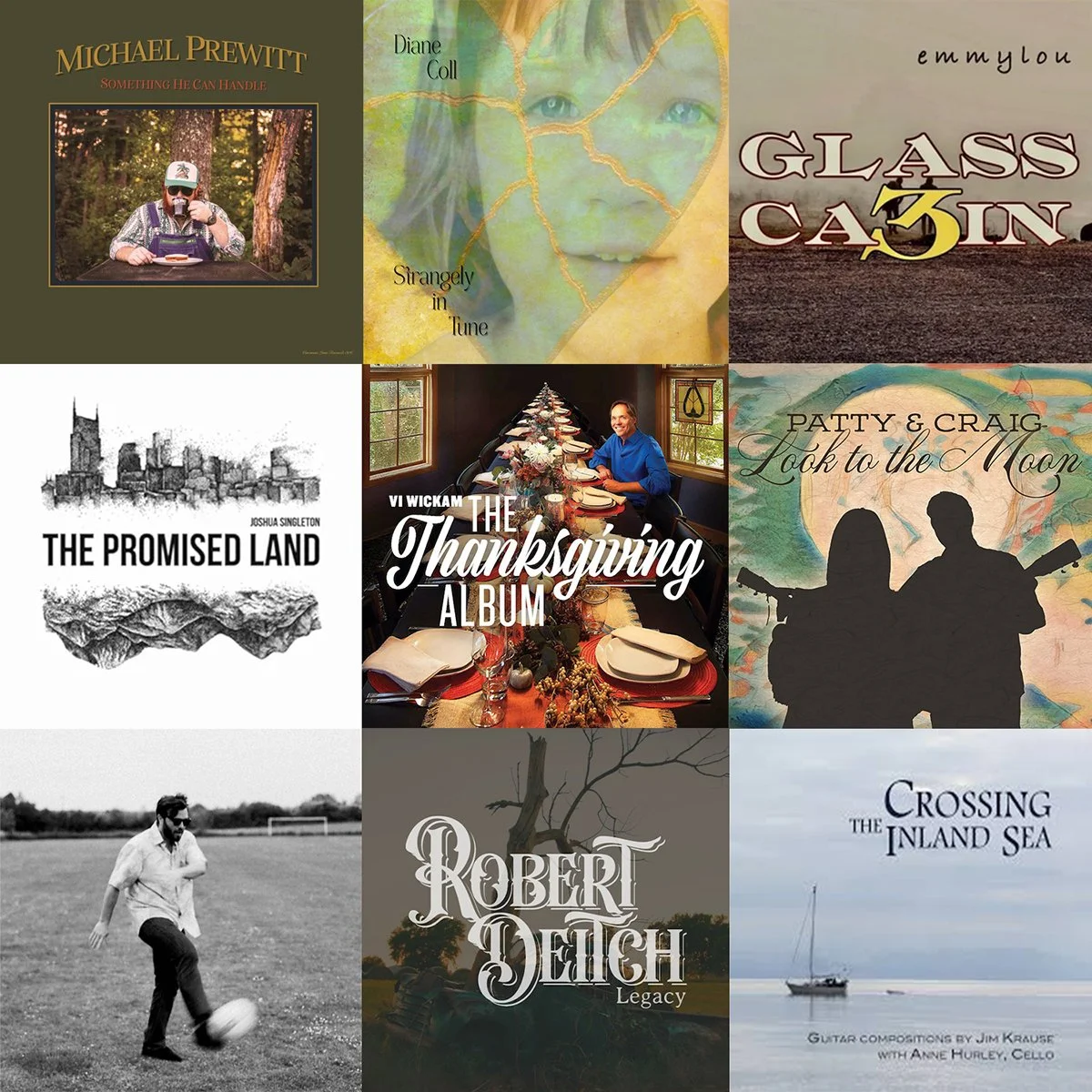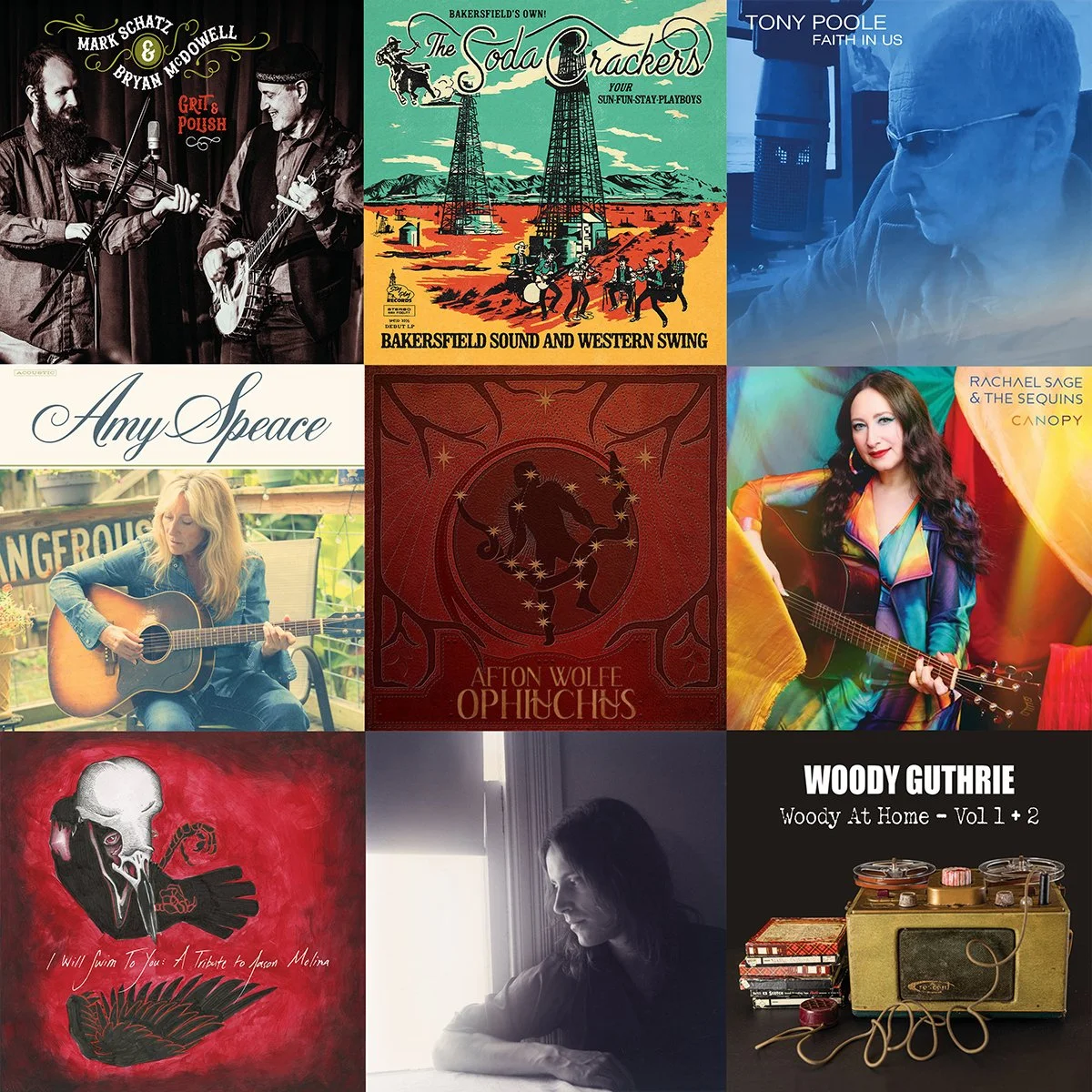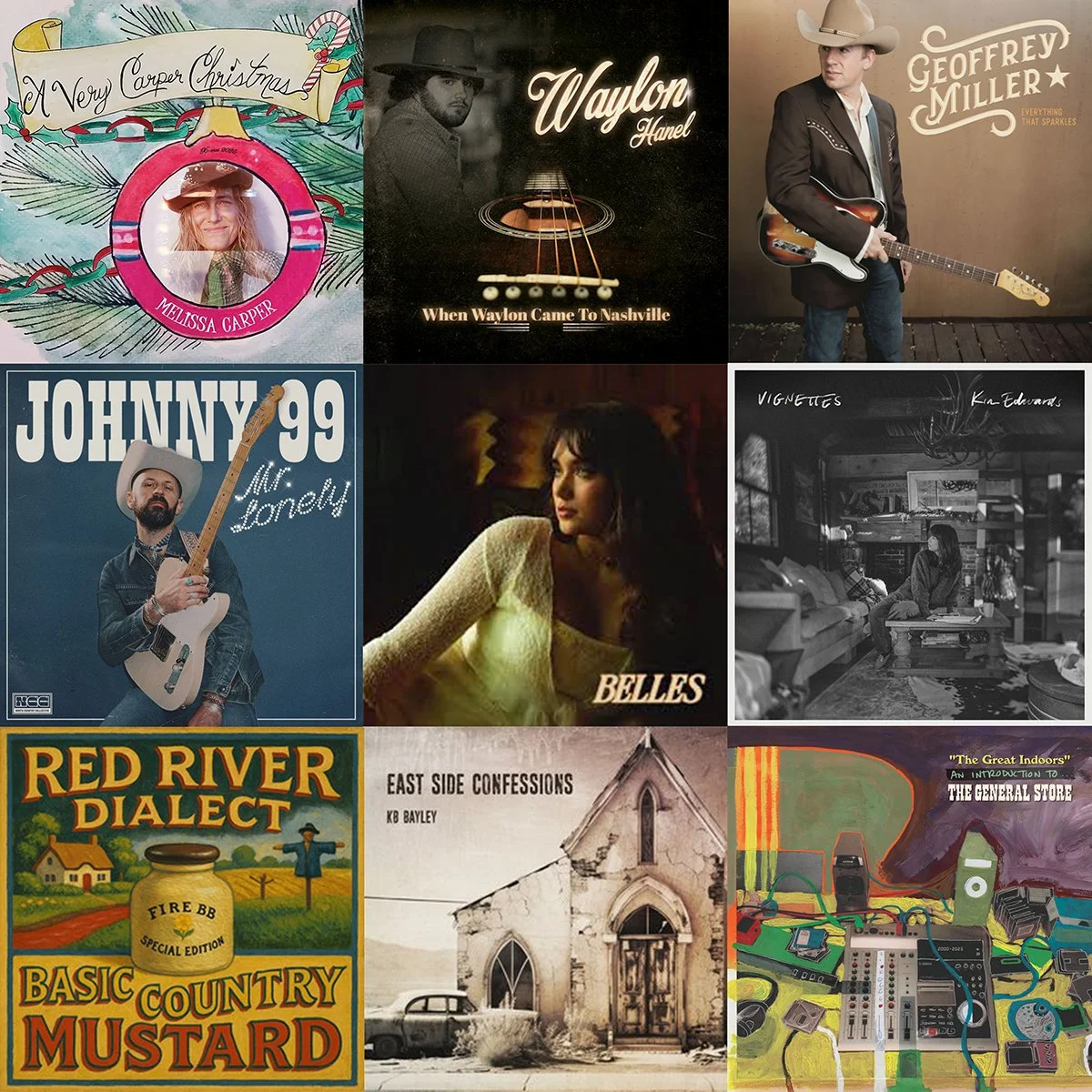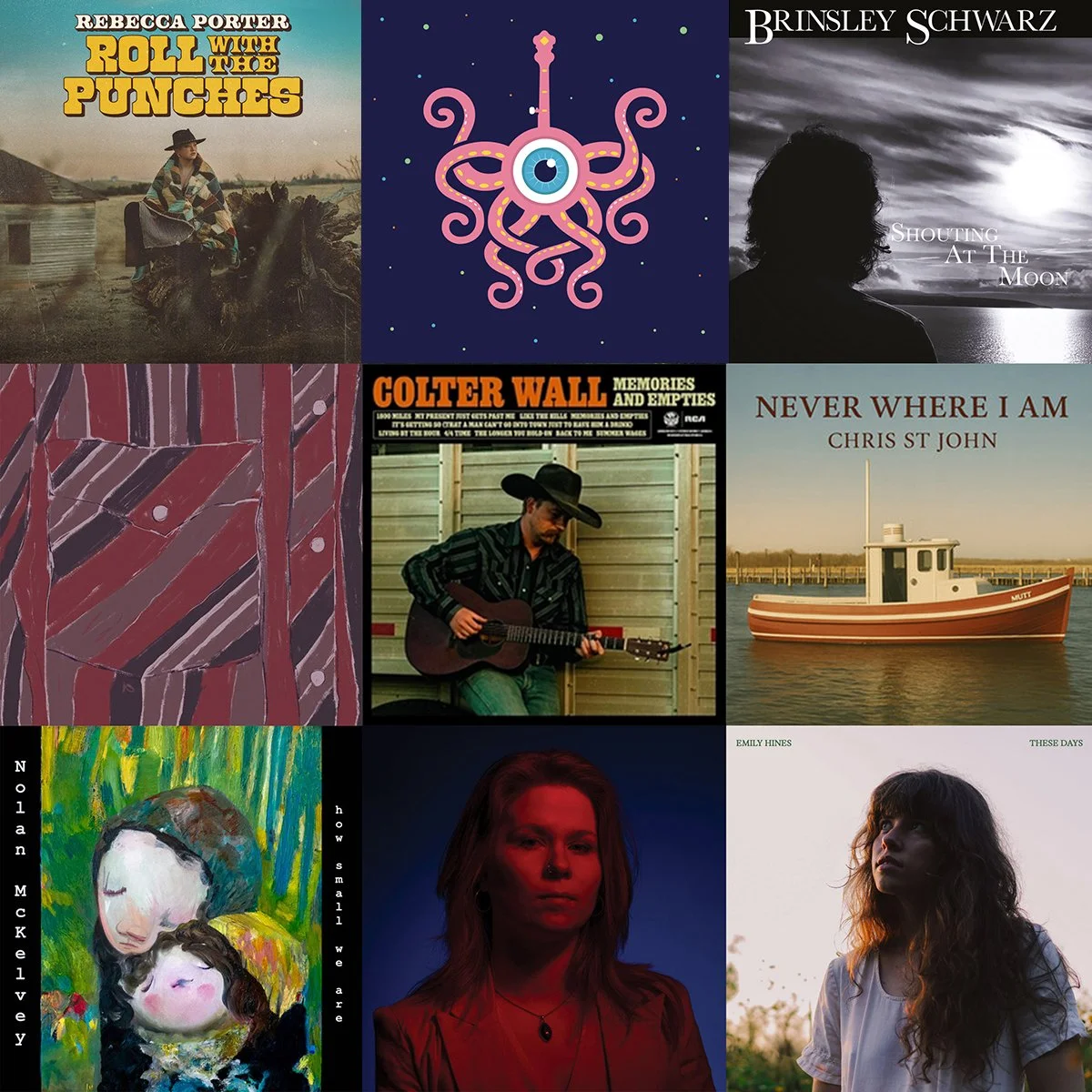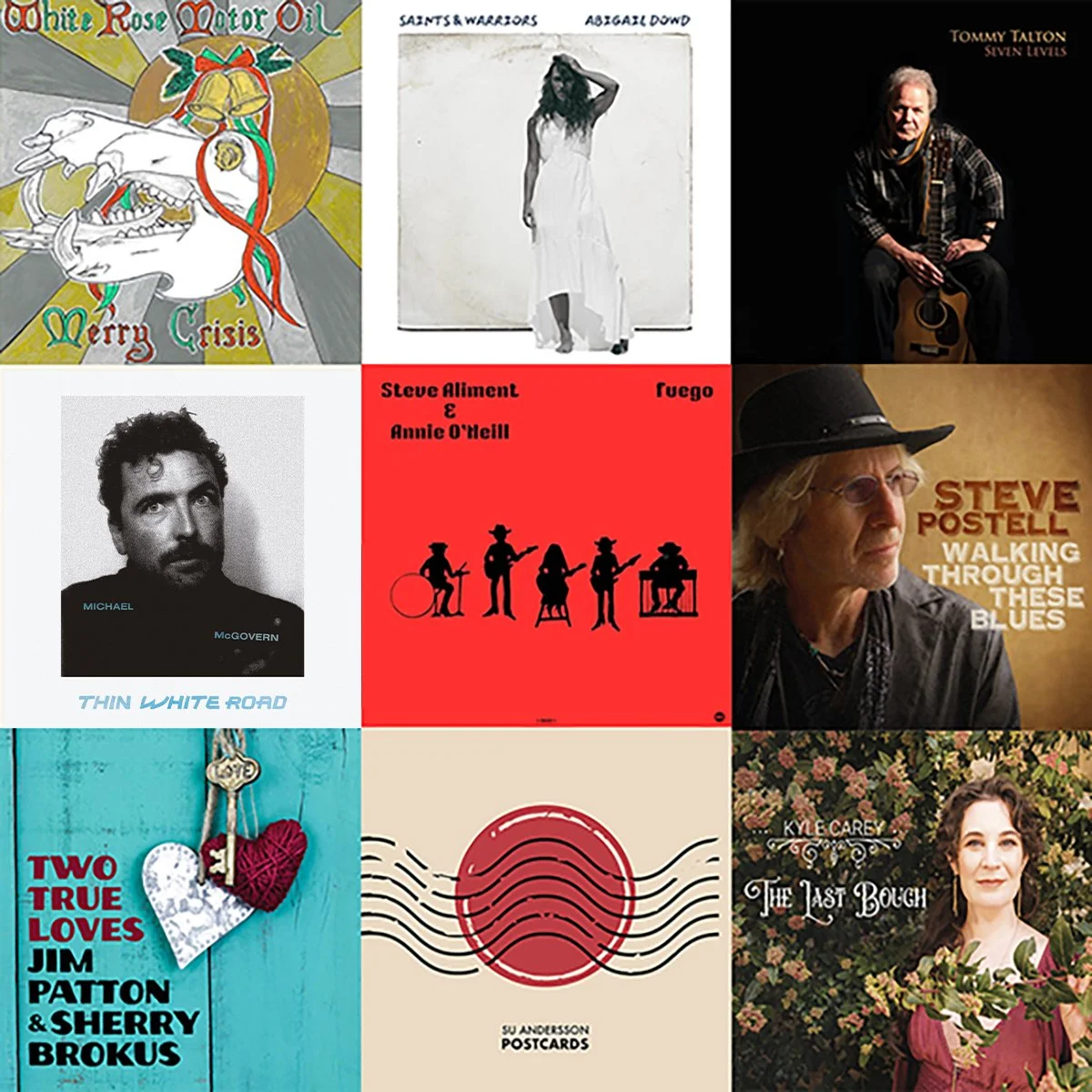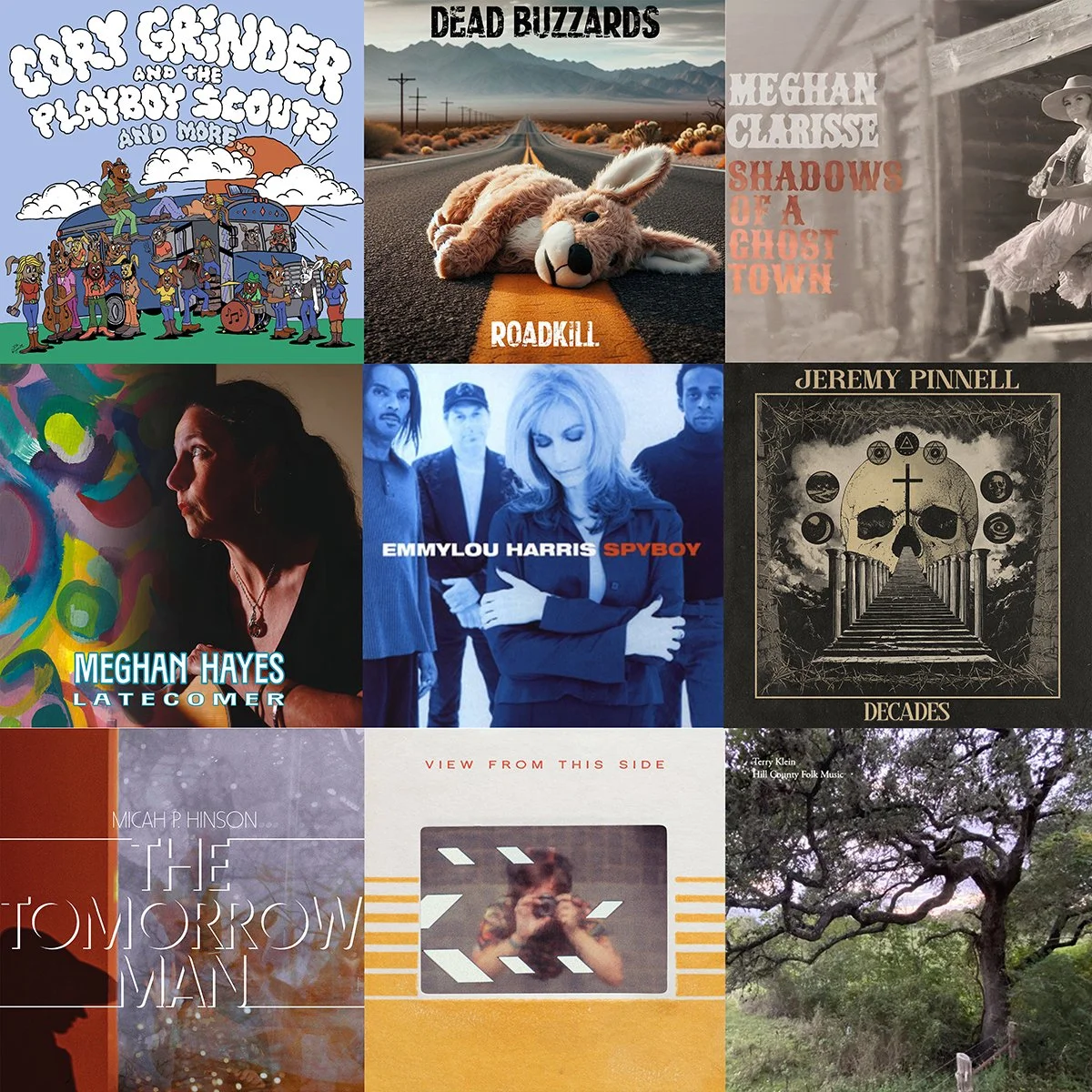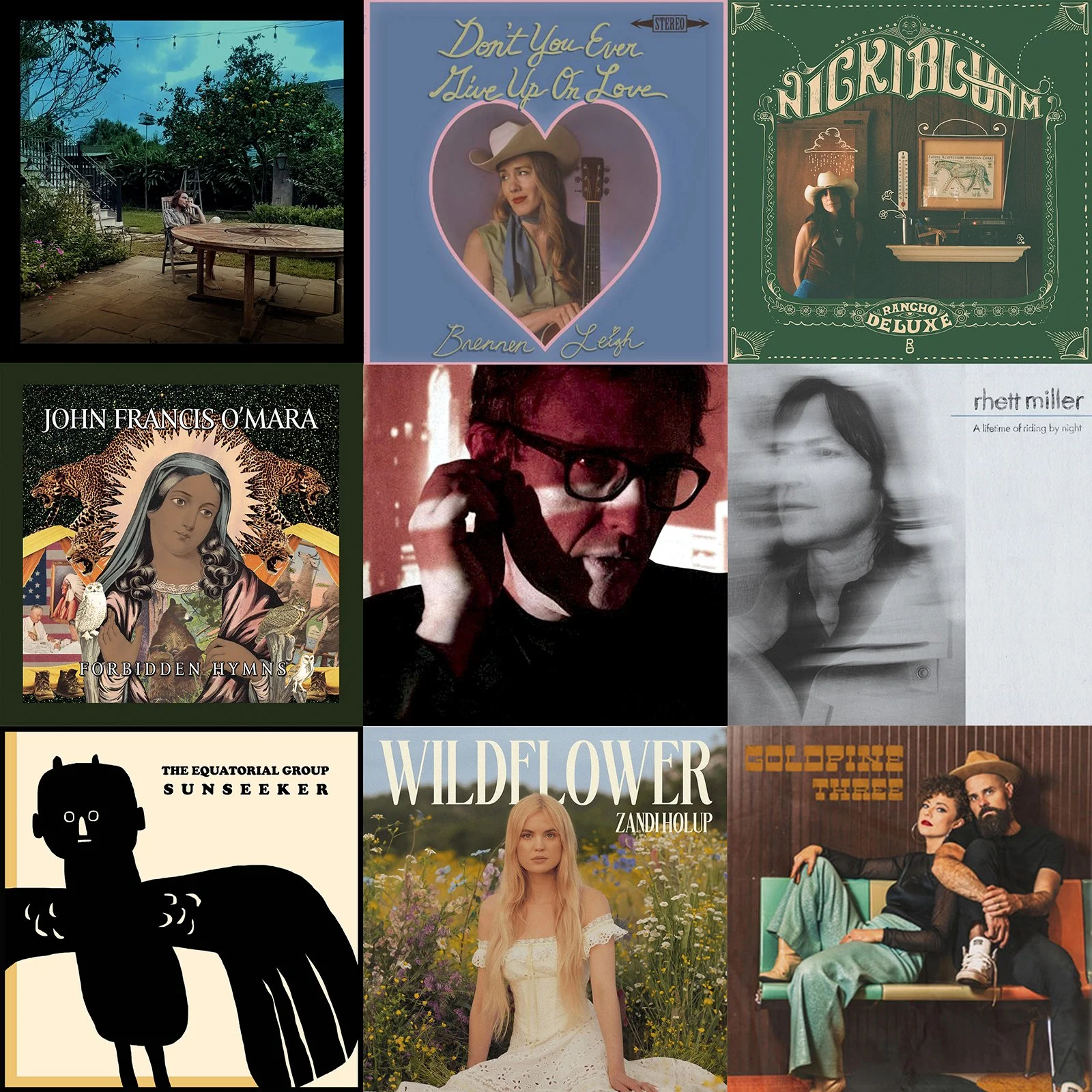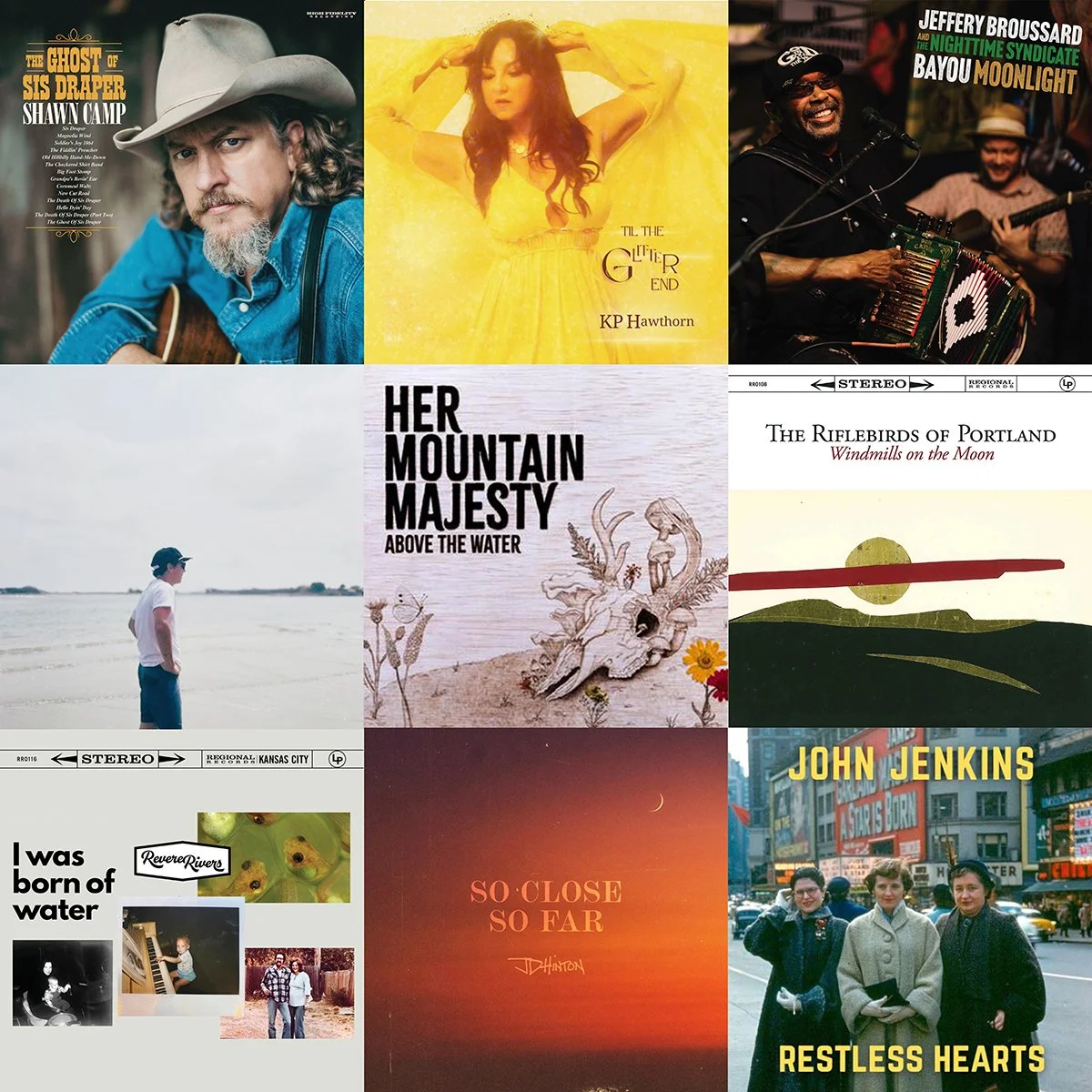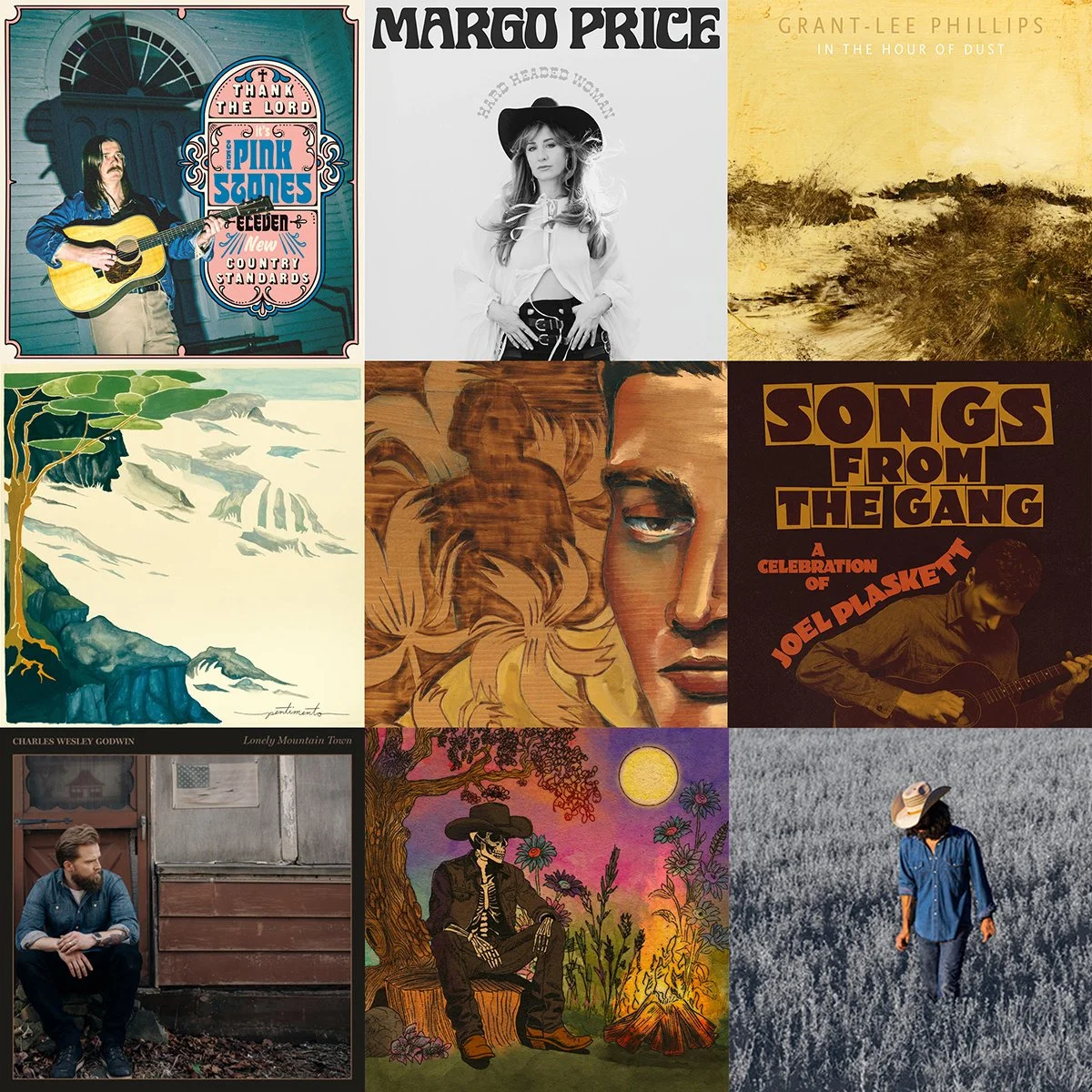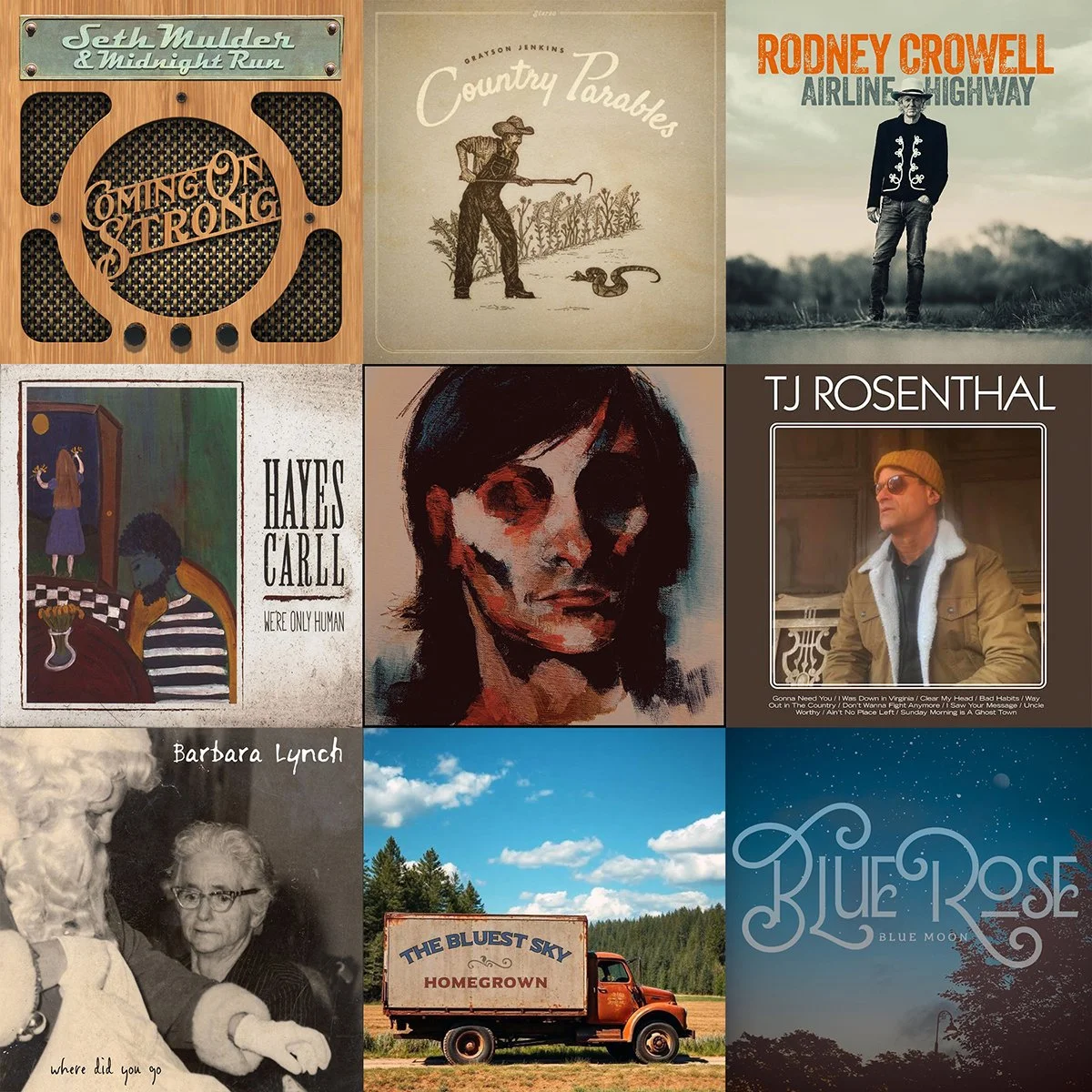Natalie Del Carmen Pastures Torrez
From piano and vocal lessons as a child to a bachelor’s degree in music from Berklee College in Boston and recording two full-length albums and an EP, Los Angeles-born Natalie Del Carmen has packed a lot into her first twenty-four years.
PASTURES follows on from Del Carmen’s 2023 album BLOODLINE, and while not deviating dramatically from the folk-pop leanings of that debut record, finds her steering towards a more traditional country/folk sound. Although a city dweller, Del Carmen’s music suggests otherwise, with characteristics related more to wide open spaces than a bustling city landscape.
Her grandfather’s 1930 banjo, which she inherited, plays a leading part in some of the more countryfied inclusions on the album. Paired with spirited fiddle playing and timely handclaps, it works its magic in the jaunty track El Cortez, a song written for her father following a gambling session with him at the El Cortez Hotel in Las Vegas. That fiddle/banjo pairing also works well alongside slick vocals in June, You’re On My Mind. Others that impress are the pedal-steel-rich Heyday and the love ballad Good Morning From Magnolia. The autobiographical Plans Upon Plans speaks of breaking free and following your dream while navigating the inevitable drawbacks and glitches encountered along the way.
Written in her childhood bedroom in Los Angeles, the album was recorded in Nashville over eight days. Del Carmen was reunited with several former classmates from Berklee College of Music, who have formed a Tennessee-based musical collective at Brunjo Music Studios, where the album was recorded.
PASTURES should prove to be another step up the industry ladder for Del Carmen. Combining perfectly paced vocals with well-crafted songs, her rising star status is well earned and, on the strength of this album, most likely to continue snowballing.
Declan Culliton
Ole Kirkeng Cowboy Lie Detector Machine Die With Your Boots On
Continuing our support for the impressive music coming from Scandinavia under the Nordicana banner, here is the latest record by Norwegian artist Ole Kirkeng. In another life, Kirkeng plays bass guitar in Courtney Marie Andrews’ touring band, and he made quite an impression on us at Lonesome Highway when he performed at Static Roots Festival in Oberhausen in 2024. A Spellemannprisen (Norwegian Grammy) award-winning artist, COWBOY LIE DETECTOR MACHINE follows on from Kirkeng’s debut album, STILL NOT LOST, from 2023.
Recorded at Rockbondon Studio, the analog studio of Swedish singer-songwriter Amanda Bergman, Kirkeng co-produced with Nashville-based Dominic Billett (Andrew Combs, Erin Rae, Caitlin Rose) and Norwegian producer Bendik Braenne. The result is impressive: Kirkeng’s crystal-clear vocals take the lead, with dreamy pedal steel, smooth guitars, and a laid-back rhythm section layered over melodic songs.
Over ten tracks, the album draws on several roots’ music subgenres. Bare Minimum delivers hook-laden country rock. Foreign Country Singer Blues is a playful Hayes Carll-type affair. The string-laden Work in Progress is a modern-day play on Countrypolitan. The title track ('She saw it in my steps, it was my first pair of boots. She knew I bought the jacket, pre-stained the gasoline. She’s a cowboy lie detector machine') offers a veiled and truthful statement that Kirkeng is essentially a city boy writing country songs. Gap Year, with a riff borrowed from Sweet Home Alabama, explores wild thoughts of taking time out and living dangerously ('I need to almost die on a scooter in Vietnam, sleep in a hostel after tripping in Amsterdam’).
While much of American country crossover music is simply rehashed pop masquerading as something else, Scandinavian artists are blending country with mainstream to perfection. COWBOY LIE DETECTOR MACHINE exemplifies this, offering a hugely enjoyable, slow-burning listen.
Declan Culliton
Tylor & The Train Robbers Live Self-Release
If you’re not familiar with Boise, Idaho-based band Tylor & The Train Robbers, this twenty-three-track live album is the perfect introduction. Recorded over two nights at Treefort Music Hall in their hometown, the band is fronted by Tylor Ketchum along with brothers Jason and Tommy Bushman, Antonio Vazquez, and Rider Soran, and their core sound is no-nonsense Red Dirt rock and outlaw country.
Included are selections from GRAVEL, their debut album from 2017, their two subsequent records NON-TYPICAL FIND (2021), and, given their hectic touring schedule, their appropriately named HUM OF THE ROAD (2024). Acknowledging a few of the artists who shaped their musical direction, the album also includes Gene Clark’s Feel A Whole Lot Better, The Doobie Brothers’ Listen To The Music, No Sweat, co-written by Pinto Bennett, Chris Wall, and Mark Webb, and Steve Young’s Lonesome, On’ry and Mean.
Expressed in a semi-spoken fashion by Ketchum, The Ballad Of Jack Ketchum tells the tale of his namesake, the 19th-century Texan outlaw. It’s a standout inclusion that runs over the seven-minute mark. One minute shorter but no less ear-friendly is Custer County. Breakneck tracks like The Way We Learn, I Got You, and Workin’ Hands sit snugly alongside the few occasions that things tone down a few notches in Lost And Lonely Miles and Place Like This.
To support the album, the band heads out on a national tour, kicking off in Denver on 4th March. This album, at one hour and forty-five minutes long, is a tour de force in gritty outlaw country and embodies the chemistry of a band at the top of its game.
Declan Culliton
Memphis Kee Dark Skies Edgewater
The title of the sophomore album from Austin-based five-piece band Memphis Kee is a matter-of-fact description of the troubled times currently playing out worldwide. It follows the band’s 2022 album WIMBERLEY and, like that debut record, mixes country and hard-edged rock in a way that Texan bands excel at. The band is Memphis Kee (lead vocals, rhythm guitar), Spencer Carlson (lead guitar, harp, vocals), Paul Pinon (drums), Joey Sisk (bass), Chris Loyd (keys, guitar, vocals) and Jake Waylon (guitar, keys, organ, harmonica, mandolin, and harmony vocals).
They’re out of the blocks in fine style with the opener I’ll Come Running’, Waylon’s harmonica intro leading into a full-blown toe-tapper pledging unconditional devotion to a lover. Despite the album’s title, there’s a softness and comfort to much of the songs. Much admired at Lonesome Highway, Texan singer-songwriter Jamie Lin Wilson, whose 2018 album JUMPING OVER ROCKS featured in our favourite albums of that year, adds her gorgeous vocals on Bewitched. Also speaking of desire and passion is Hummingbird, but in this case, illicit love.
It’s not all sweet sentiment and starry-eyed either. The bluesy All The Rest speaks of a relationship broken beyond repair (‘I wish you the best, I’m thankful for the good times, I’m so sorry for all the rest’) and bad choices, being stuck in a dead-end job and a relationship gone south surface in With None, a fully charged cry for help that wouldn’t have been out of place on an early career Drive By Truckers record. Ramping up the sound even further is the thumping album closer Twenty Dollar Chain about a young guy ready to let rip with his first paycheck -Friday night, feeling no pain, thousand-dollar boots, twenty-dollar chain’.
Produced by Grammy award winner Adam Odor (Mike and The Moonpies, Colter Wall, Willie Nelson, James Hand) and recorded at Yellow Dog Studios in San Marcos, Texas, DARK SKIES is everything you’d hope for from an Austin band. Deep, gritty vocals telling compelling stories, combined with slow rolling grooves in places and driving guitars and keys elsewhere. No doubt these guys would be killers in a live setting.
Declan Culliton
Rick Shea Smoke Tree Road Tres Pescadores
Having listened to Rick Shea through the years, I have long been an admirer of his ability to tell a story as well as acknowledging his musical talent and production prowess. He now is about to release his eight solo album (alongside two others he shared the credits with, namely Patty Booker and Brantley Kearns). He has also made numerous guest appearances on releases by the likes of Dave Alvin’s Guilty Men. He is a seasoned pro with a warm and welcoming voice that feels like that of an old friend.
For this new recording, he gathered around him a group of players who are like-minded and who further expanded on the delivery of this set of songs, including the foundation of a variety of rhythm sections. Due to the nature of recording these days, recording was carried out in a number of different studios. Then each track adds such accompaniment as required, by the likes of Eleanor Whitmore on fiddle, Tony Gilkyson on acoustic guitar, David Livingston on pedal steel, the accordion of Robert Rodriguez, the Hammond B3 of Skip Edwards, Danny McGough on Wurlitzer, while Jeff Turmes added saxophones; plus some further individual contributions like Celia Chavez on vocals. Even though many added their parts via an online platform, the album has a coherence and clarity that belies that fact and is testament to how such endeavours can now be realised.
The majority of the songs are written by Shea and, as such, it is never difficult to interpret what is the essence of the story being told. The opening song A Week In Winnamucca is a fondly remember time playing in a small casino in that town, a role that Shea rarely takes on due to creative restrictions but, thankfully something not enforced there. Shea was something of a wanderer in his youth and he recounts some of that in Guardian Angel. He sought music as he travelled but felt that he was being watched over to come to the place he is in now. His family history and ethos is the subject of An Irishman’s a Laborer at Heart. There is a nod to the music influences of Memphis and New Orleans in Georgia Bride.
The first of the covers is up next in the song Midnight Shift, previously recorded by Buddy Holly amongst others. The next song is a co-write between Jennie Moyeda and Shea, it tells of, amongst other things, a famous Mexican film star Maria Felix and is given a suitable musical setting wherein he is joined by Celia Chavez vocally. Some parts are sung in Spanish, which only add to the overall feeling of the song. That feel, with some effective Spanish guitar and accordion, is continued in El Diablo Manda. A more forceful comment on current times than perhaps elsewhere, translates as “the devil rules the roost.”
The other cover song is a version of the much loved and often covered Long Black Veil, included because it’s a song that Shea loves. He does a worthy reading and it features some fine guitar and saxophone playing as well. Delia is about losing someone close to you, a person who perhaps was capable of understanding another’s depth. It echoes musically with that quiet melancholy sentiment. A track first recorded for his debut cassette album and co-written by Wyman Reese is given a new lease of life here. One More Night is a song that looks to a future with some hope but recognising that it is something that may not be achieved. In a more Western inspired theme we have the instrumental twang closing track, Trailrider. It conjures up its title with ease and evocation.
There is one further unlisted track as a coda to the album in Juniper Tree, an unaccompanied vocal with ambient bird, dog and children sounds in the background. It’s a song he sometimes sings to his granddaughter, its inclusion underscoring the overall sense of a person who is at ease with his life and career, simply making music for the love of it and working with friends to create that which can comfortably exist in such a simple location.
Stephen Rapid
George Mann and Mick Coates Ghosts Of the Old West Running Scared
From New York, America to Victoria, Australia is a long distance to travel and the presence of these two Folk musicians at the Maldon Festival developed into a friendship that spanned the miles and offered the opportunity to unite as fellow-artists from opposite sides of the world. George Mann is known for his work as an activist and union organiser. Over the years he has released a number of albums that focus upon the topics of social injustice, the futility of war, and the support of veterans, along with the marginalised in our societies. Mick Coates writes songs about the plight of the Aborigine peoples and the abuse of power by corporate and political interests. Both musicians share a lot in common and come together across eleven songs to explore their mutual craft.
Mick Coates has a rich baritone vocal and his delivery is very much akin to a Johnny Cash styled cadence. He contributes three of the eleven songs included here and on the self-penned That Sweet Plaintalkin’ Country Girl, he sets the template for the album as he delivers a lyric that reminisces over an old flame that slipped away over the time. The life of a cowboy on the trail is another song that Mick performs and it was written by his friend Charlotte Buckton with him in mind; Lonesome Plains has atmospheric violin by Tim Ball and the sense of being alone on the prairie is superbly captured. In Irons From Limerick City is a co-write, with Mick delivering an Irish Folk ballad that echoes the traditional air of At the Rising Of the Moon (John Keegan Casey) in the melody. It’s a tale of being transported across the ocean as a criminal to form part of Australia’s colonisation programme.
George Mann contributes lead vocals on songs like They Call Her Dolly Parton which details the story of visiting a relative in a nursing home, where her diminished faculties don’t allow recognition or communication to take place. George also sings on For the West to open the album and it is an atmospheric country arrangement with prominent violin and electric guitar on a song about leaving home to experience new adventures. The protest song Anymore (Harry Stamper) dates back some forty years but is as relevant today as ever ‘We pay for prosperity with the slaughter of the poor.’
Another vocal that is shared by both George and Mick is a cover song, The Reverend Mr. Black (Billy Edd Wheeler, Mike Stoller, and Jerry Leiber), and sung in a Gospel themed style. The presence at that Folk Festival in Australia is perhaps the genesis of the song ‘Till the Cows and ‘Roos Come Home’ with a drinking session around Mick’s kitchen table bringing the inspiration. Ira Hayes unfolds a story of the hypocrisy in American society where a war hero is reduced to a state of alcoholism upon returning home and finding no recognition for his deeds, just hostility. The song was written by Peter La Farge and covered many times by the likes of Johnny Cash, Pete Seeger, Bob Dylan and Townes Van Zandt as an anti-war song, more commonly known as "The Ballad of Ira Hayes."
The title track is a song that appears twice on the album, with each song written separately by both George and Mick. One details a love tale that ends in the murder of an innocent man, the other tracks a classic cowboy western theme to border towns, Pat Garrett and Billy the Kid, and drinking in Cantinas. It’s all a lot of fun with the assembled musicians doing real justice to these songs. Colourful and a fine collaboration.
Paul McGee
Sam Lewis Everything’s Fine Loversity
Stripped down, intimate songs from a musician who has been creating excellent albums since his debut back in 2012. This latest project was recorded, produced, engineered, and mixed by Joe V. McMahan at Wow and Flutter Studio in Nashville, which is home to Lewis since he moved there in 2009. McMahan contributes on an array of instruments across the eleven songs and his prowess on acoustic and electric guitar, dulcimer, pedal steel, bass, keyboards, organ, piano, synthesiser, percussion, is a real benefit to the tone and character on these song arrangements.
There is a charmingly simple atmosphere that informs the arrangements and the easy groove is reminiscent of a late night session where the assembled players quietly follow and interpret the acoustic lead lines with creative input. The instrumental Lischey’s Retreat is a short and perfectly rounded example of this approach. There is an addictive groove on Making It Up and the combination of drum shuffle and upright bass is a real joy. Judy Blank guests on The Light to great effect, her co-vocal offering a perfect mirror to the soft delivery of Lewis on a song about frustrated love ‘If I can’t be who you want me to be, Don’t leave the light on.’
Elsewhere we have the country lilt of Chase the Moon and the atmospheric pedal steel of Joe McMahan complimenting the understated acoustic and electric guitars. Old Love sounds like a throwback to the crooner days and the presence of a Tony Bennett lingers in the soft, intimate style. On My Life Living Me there is a creative rhythm that fuels the song and a sense of almost a Buddy Holly song trying to break out.
The sad realisation that love has run its course is wrapped up in I’ll Never Be Enough For You and the inner conflict of ‘I’m somewhere in between, the windowsill and the windowpane’ is echoed in the gentle acoustic playing. The opposite emotion is expressed on Nothing Could Break Us Apart where the bond of love is the glue that keeps a belief in happy endings. The title track has the feeling that no matter how things may look, the best perspective to apply to inner and outer struggles with life, is the mantra that Everything’s Fine.
Another song I Know reflects upon the fact that ‘There will always be more to learn than I’ll ever know’ and again the pedal steel of Joe McMahan is prominent in the melody. The final track is a cover of the Indigo Girls song Three County Highway and there is a sense of longing in the reflections of wanting to repair the past ‘One day I'm gonna make it up to you, one day we're gonna laugh instead of cry, One day I'm coming home to stay, it's true, and baby, that's the last ticket I'm ever gonna buy.’
The album cover gives no sense of the style of music that awaits within, and the image of a frog perched on a man’s head is somewhat disarming. The presence of welding glasses on the figure lead me to the saying “there are none so blind than those who will not see.“ Then again, in certain cultures the frog is revered as a symbol of renewal and transformation. I guess it’s up to us all to decode this subjectively, and the willingness of Sam Lewis to explore new soundscapes in his music is certainly to be admired. A very interesting collection.
Paul McGee
Cousins and Willoughby The Bridge Witchwood
Hidden treasure can be found in the strangest of places and at points in time when the furthest thing from your mind is the discovery of something that has been there, under the surface, for all this time. It was serendipity which brought this collection of songs to my attention and I’m so grateful for the opportunity to reacquaint myself with a time in my youth when English folk rock was not only a big influence in my growing appreciation of music, but it was also a time when the genre itself was making great strides.
Prior to the punk meltdown in the late 1970s, there existed such a rich heritage of terrific music in albums that appeared from bands such as Audience, Curved Air, It’s A Beautiful Day, Fairport Convention, Sandy Denny, Richard Thompson, Pentangle, Steeleye Span, Lindisfarne and so many more. We were spoilt for choice, and one of those bands that always stood out for me was The Strawbs. Founded in the 1960s as a Bluegrass group, they became one of the darlings of the new Folk movement, gradually moving into a more Rock based arena as their popularity grew and new members joined the ever-changing line-up over the years.
This album is something of an heirloom that has been patiently awaiting the moment when it could be finally introduced to the world. Dave Cousins was a founding member in the Strawbs and he remained at the central creative core of the band for their entire journey over the decades. In the 1970s he invited Brian Willoughby to join the band and the duo often played outside the main group in different formats together. There is such a synchronicity in the fluid guitar of Brian Willoughby and the plaintive, wistful vocal delivery of Dave Cousins; a unique voice that can at times remind one of a Roger Chapman or Gary Brooker in the intonation.
This recording was originally conceived as ten songs with essentially a full membership of Strawbs players, either past or present at the time. They were joined by the beautiful vocals of Mary Hopkin on four of the tracks, and she was one of the first artists signed to the Beatles Apple Record Label back in 1968. The songs remind me of the immense talent possessed by Dave Cousins, in his ability to capture a mood or a moment in song, and in his convincing vocal delivery that accompanied his fine guitar playing. He had the perfect foil in Brian Willoughby who displays an inspiring dexterity and colour in his guitar technique, which is laced with emotional expression and impressive skill.
The songs vary from big sounding arrangements to quiet acoustic melodies, starting out with the excellent groove of You Never Needed Water which sets a high bar in terms of performance, with Brian Willoughby dazzling on lead acoustic and a song that recounts a tale of female doggedness in pursuit of her goals ‘You sparkled like a diamond with a smile that you could trust, Until you found yourself a sucker and you ground him into dust.’
The classic Strawbs sound is captured on the poignant Further Down the Road with Blue Weaver on rich keyboards, Chas Cronk on bass, and Tony Fernandez on drums adding to the lovely harmony vocals of Dave Cousins and Mary Hopkin, as Brian Willoughby raises the dynamic with some fine guitar ‘Strike the fiddle, start the hoedown, rid me of my heavy load, I can see those bright lights shining a little way further down the road.’
Heat Of the Street is a fine rocker that captures the energy of going out for a good time and letting your hair down. Another song celebrates the meeting of two lovers and the giddy thrill of first discovery, and Do You Remember? brings back memories of youth ‘Do you remember the day we met, How we kissed the way they do in France?’ The rocking beat on Oh So Sleepy is a song that sees stinging guitar phrases from Brian Willoughby lift the arrangement, and the rhythm section of Rod Demick (bass), and Richard Hudson (drums) make an appearance.
Morning Glory is a love song that captures that feeling of closeness that transcends words ‘We will climb the mountainside, a multitude of dreams.’ The other side of love is captured on Cry No More and a sense of regret for the changes that can visit any couple in a relationship ‘Never trust a girl who takes it all for granted, Never mind the rain when it’s pouring down.’ A highlight is the atmospheric The Plain and a song about journeying forth in search of new adventures ‘Throughout my endless journey I’ve been searching for paradise lost, I now retract my footsteps with the burden of infinite cost.’ The gentle melody on Song For Alex is perfectly delivered on acoustic guitars and showcases the special dynamic shared by Dave Cousins and Brian Willoughby in the rise and fall.
There are four bonus tracks included on the album and also a recording of Dave Cousins recalling his initial meeting with Sandy Denny, who played with the Strawbs for a very brief period before she went on to join Fairport Convention. Dave relates the story surrounding his receipt of the news about her shock passing at the age of just thirty-one. It is very heart-felt and captures a moment in time when the Folk world went into mourning for one of its greatest-ever singers. Ringing Down the Years is performed in her memory and it’s the longest track included here. Both Cousins and Willoughby excel on the performance as if they were compelled to honour Sandy’s greatness with their own creative gifts.
Desert Song together with Ways and Means are fine songs and contain that great spark between Cousins and Willoughby as the acoustic guitars blend into the melody. The final song is Beat the Retreat and the stoic acceptance in the vocals is an indication of the nostalgia Cousins felt as he looks back at a life lived ‘The last post is sounding, Now it's time to be gone, There's no further reason, For singing this song.’ It’s an appropriate way to end an album that stands as a special memory of Dave Cousins who died in Canterbury, in July 2025, at the age of eighty-five. As a bridge to the past, this album is priceless.
Paul McGee
Jeffrey Martin Alive July 25, 2025 Loose
This live album was recorded in Portland, Oregon at The Showdown venue and is an absolute cracker. It features Jeffrey Martin on lead vocal and guitar, joined by Sam Weber on guitar and backing vocals. Those who already know of the great attraction that is manifest in the songs of Jeffrey Martin will know exactly what to expect, and newcomers to his creative talents will be suitably impressed.
Across seventeen songs we are treated to the deep humanity and insight contained in the words of Jeffrey Martin and the joy of live performance is captured perfectly on the night. Having the foil of Sam Weber adds richly to the dynamic of the night and his contribution in adding nuance to the songs is very marked. There are five songs from the most recent album Thank God We Left The Garden (2023), four songs are included from Dogs In The Daylight (2014), and two songs from One Go Around (2017). In 2012 Jeffrey Martin released a six-track EP titled Build A Home, and there are two songs included from this project, in addition to a few songs that have yet to feature on an official album, plus a cover of the Neil Young classic Out On the Weekend.
The unique nature of live performance is where Jeffrey Martin really excels and his heartfelt words really hit home like an arrow when placed into an intimate setting where the audience is locked into the knowledge that they are witnessing something that will never be repeated or captured again in the moment. The show begins with a performance of the single I Know What I Know and the song protagonist is sticking rigidly to a particularly narrow self-created view of what he finds in daily living ‘I read the news, I watch the speeches on tv, The only thing true, Is nobody is who they’re claiming to be.’ He includes a section of the Woody Guthrie song This Land Is Your Land at the song end.
Keeping with the sense of fragility and doubt of these divided times, Jeffrey follows with a performance of Paper Crown and the reassurance that none of us really know where to find our place in the overall scheme of things. The sense of not having control is something that we don’t like to admit of course, but we can take comfort from everyman ‘Get up and go to work in the darkness, Come home and try to hold onto something, It’s a wheel that goes around.’
Our moral compass is the question that we all have to align with when it comes to looking in the mirror and on the song Dogs In the Daylight Jeffrey sings that ‘The wolves in the dark, they’re only dogs in the daylight.’ Another older song is Thief and A Liar and Jeffrey reveals the kind of men who major in deception as a means for negotiating their world, never caring for the misery they wreak. The subtle superb guitar lines from Sam Weber are a joy.
Quiet Man is a highlight with the life lessons rolled out for all to debate; whether kindness is enough in our passing of time, or whether love and understanding house a deeper knowledge, waiting to be unlocked ‘ There's an angry man on the mountain just like there's always been, And there's a quiet man in the valley standing taller than him, And there's a child with a secret that she doesn't know she holds, And the fact that I can see it means that I am growing old.’
One Go Around speaks of making the best of what we have on this planet and that, perhaps we do only get one chance in the way we choose to live out our days. Galveston is a song about moving on and trying to leave a relationship in your rear view mirror, and the unrecorded song 1519 is a flight of fantasy that places a young boy in the armada of Hernán Cortéz as he chases the adventures of a life on the ocean wave instead of that as a farmer. The Middle is a song that speaks of balance and of not judging others ‘Don't go running your mouth on me, About the light and the dark and nothing in-between, I see a right and a wrong and a line in the middle.’
Billy Burroughs is about the poet and writer who shot his lover in a Mexican bar while drunkenly trying a trick shot. The cost of excess and the price of apparent freedom from choices. Wellspring comes along as a parable that the sins of the father are foisted on the children. A drunk and a gambler who tries to outrun his demons but ends up having them visit in a way that tears the family apart. The cover of the Neil Young song Out On the Weekend is one that fits nicely into the performance dynamic and that search for connection is central to the song.
Another standout moment is the performance of Red Station Wagon and the insight gained from witnessing bigotry and homophobia in our society ‘The church was a boot on your neck since the day you were born, They didn’t like the way that you talk or how you move in the world, How you glide like a leaf on the water all gentle and kind, The world wants a man who is hard - not hard to define.’ The song is full of grace and understanding in the sentiment, and delivered with real emotion.
Gold In the Water dates back to 2009 and is a gentle song about dreaming big and being patient, while The Garden is a more recent song penned by Jeffrey and there is a false start to the song caused by a catch in his throat, which he plays off brilliantly by riffing a lyric about it. The words ‘I want to know the secrеts, I want to peek behind the curtain, I want to find out for certain, If I’m here on purpose’ show that within us lies the beauty we seek and the answers to our own truth.
The show concludes with a performance of There Is A Treasure the most precious of songs and one that expresses a deep compassion that underlines the message of human fragility in all of its guises ‘There’s a treasure that we all know, but we can’t have it, It’s a place beyond the measure of our minds, It is where we go when we forget we’re living, It is where we go when we forget we die.’ We come and we go and it is within each of us to live with both humility and gratitude while we are visitors here. Jeffrey Martin is very special and I am certainly grateful for his presence among us as an artist of the highest quality. This album is an essential purchase.
Paul McGee

